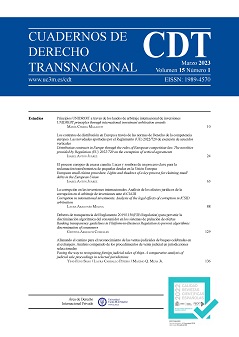Delimitation of habitual residence as the main attributive criteria of jurisdiction in European family law and applicable rules in the absence of a competent member state in accordance with the recent doctrine of the CJEU
from a possible undercover forum on the nationality of the defendant to faltering cases
Abstract
The Court of Justice has recently issued a resolution with significant practical consequences in the field of European Family Law, although the assessments on it are very different depending on the issues resolved by the meaning of the ruling. The ruling of August 1, 2022 (C-501/20, MPA vs. LCDNMT), addresses two major issues, both linked to the sector of international judicial competition, which deserve an in-depth analysis for different reasons. On the one hand, the Court specifies the relevant elements to determine the habitual residence of the parties in matters of Divorce (marital crisis), parental responsibility and maintenance obligations, as a fundamental criterion of jurisdiction under the Brussels II and Brussels III Regulations, completing the doctrine already in force and adapting it to the referenced case. Starting from the premise that none of these European instruments contains any definition in this regard, this judgment is decisive in locating the competent national jurisdiction in a case such as the one at hand, in which the spouses are EU agents, so the diplomatic immunity is raised, and consequently its potential incidence in this issue. On the other hand, this ruling specifies the conditions under which a court of a Member State of the EU, before which the claim has been filed, can establish its jurisdiction to rule on matters of divorce, parental responsibility and maintenance obligation when, in principle, no Member State is competent, when those involved hold the nationality of different Member States but have residence outside the Union, based on the rules of residual jurisdiction or forum necessitatis provided for in the applicable European instrument. The -restricted- interpretation that is made of the rule of residual jurisdiction in matrimonial matters in the Brussels II Regulation, is especially controversial, to the extent that it opens the door to a potential forum of the defendant’s nationality as well as to possible faltering cases, due to a denial of justice, when the internal jurisdiction law does not provide for this type of connection criteria.




